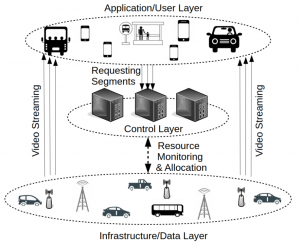Paper accepted: QoCoVi: QoE- and Cost-Aware Adaptive Video Streaming for the Internet of Vehicles
Elsevier Computer Communications journal
Alireza Erfanian (Alpen-Adria-Universität Klagenfurt), Farzad Tashtarian (Alpen-Adria-Universität Klagenfurt), Christian Timmerer (Alpen-Adria-Universität Klagenfurt), and Hermann Hellwagner (Alpen-Adria-Universität Klagenfurt).
Abstract: Recent advances in embedded systems and communication technologies enable novel, non-safety applications in Vehicular Ad Hoc Networks (VANETs). Video streaming has become a popular core service for such applications. In this paper, we present QoCoVi as a QoE- and cost-aware adaptive video streaming approach for the Internet of Vehicles (IoV) to deliver video segments requested by mobile users at specified qualities and deadlines. Considering a multitude of transmission data sources with different capacities and costs, the goal of QoCoVi is to serve the desired video qualities with minimum costs. By applying Dynamic Adaptive Streaming over HTTP (DASH) principles, QoCoVi considers cached video segments on vehicles equipped with storage capacity as the lowest-cost sources for serving requests.
 We design QoCoVi in two SDN-based operational modes: (i) centralized and (ii) distributed. In centralized mode, we can obtain a suitable solution by introducing a mixed-integer linear programming (MILP) optimization model that can be executed on the SDN controller. However, to cope with the computational overhead of the centralized approach in real IoV scenarios, we propose a fully distributed version of QoCoVi based on the proximal Jacobi alternating direction method of multipliers (ProxJ-ADMM) technique. The effectiveness of the proposed approach is confirmed through emulation with Mininet-WiFi in different scenarios.
We design QoCoVi in two SDN-based operational modes: (i) centralized and (ii) distributed. In centralized mode, we can obtain a suitable solution by introducing a mixed-integer linear programming (MILP) optimization model that can be executed on the SDN controller. However, to cope with the computational overhead of the centralized approach in real IoV scenarios, we propose a fully distributed version of QoCoVi based on the proximal Jacobi alternating direction method of multipliers (ProxJ-ADMM) technique. The effectiveness of the proposed approach is confirmed through emulation with Mininet-WiFi in different scenarios.

